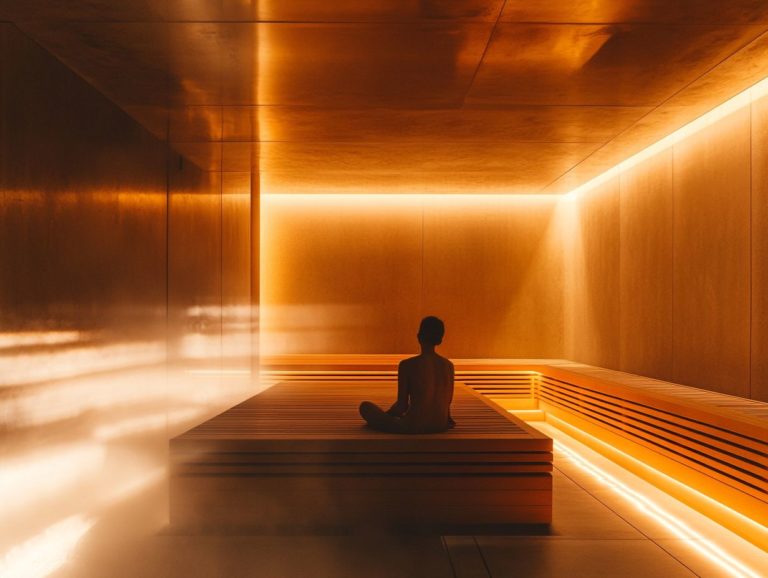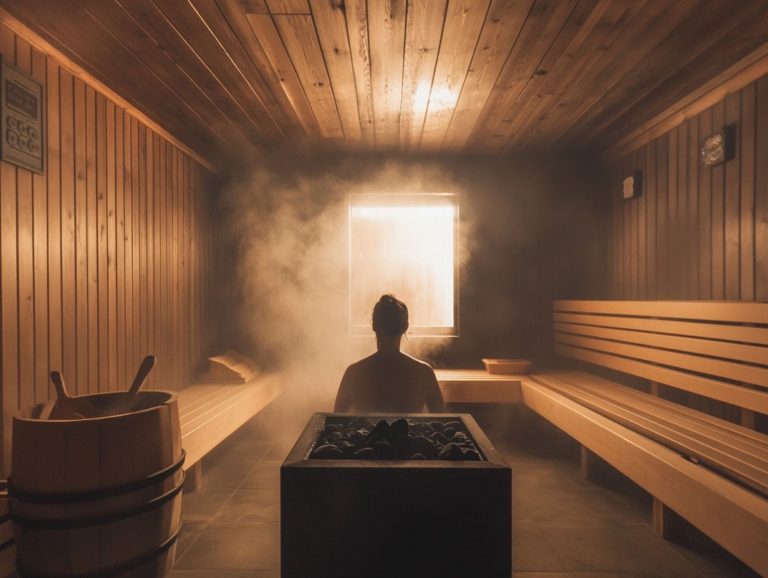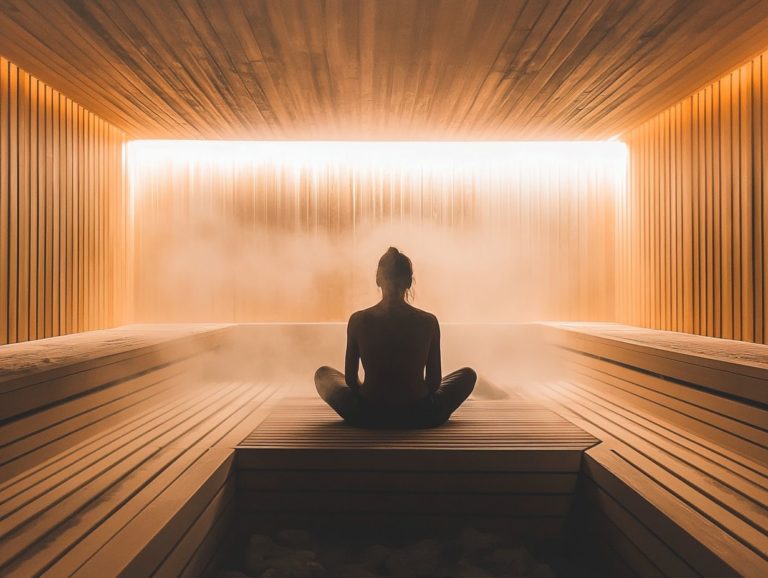The Link Between Saunas and Better Sleep Patterns
Struggling with sleepless nights? You’ll be amazed to discover how saunas can revolutionize your sleep quality.
This article delves into the myriad benefits of integrating sauna sessions into your nightly routine. You ll explore how heat impacts brain waves and hormones, compare traditional and infrared saunas, and uncover practical tips to enhance your sauna experience.
This article also covers potential risks, helping you enjoy the benefits safely. Discover how a touch of heat can transform your nights into restful, rejuvenating experiences.
Contents
- Key Takeaways:
- The Benefits of Saunas for Sleep
- The Science Behind Saunas and Sleep
- Types of Saunas for Better Sleep
- Tips for Incorporating Saunas into Your Sleep Routine
- Potential Risks and Precautions
- Frequently Asked Questions
- What is the link between saunas and better sleep patterns?
- How does using a sauna promote better sleep?
- Is there a specific sauna temperature or duration that is most effective for sleep?
- Can using a sauna before bedtime disrupt sleep?
- Are there any other benefits of using a sauna for sleep besides relaxation and pain relief?
- Can anyone use a sauna for better sleep patterns?
Key Takeaways:

- Saunas can improve sleep quality by promoting relaxation, reducing stress and tension, and increasing melatonin levels.
- The heat and steam from saunas can affect brain waves and hormones, leading to better sleep patterns.
- Infrared saunas may be more beneficial for sleep compared to traditional saunas due to their ability to penetrate deeper into the body.
The Benefits of Saunas for Sleep
Saunas have become a sought-after wellness tool. They provide an array of health benefits that can greatly improve your sleep quality.
The soothing effects of heat therapy work wonders for those grappling with stress, anxiety, or chronic fatigue, creating an ideal setting for restorative sleep.
As you elevate your body temperature and indulge in muscle relaxation, saunas trigger the production of endorphins and melatonin. These hormones foster overall mental well-being and establish healthier sleep patterns, essential for your vitality and health.
How Saunas Can Improve Sleep Quality
Utilizing a sauna can significantly enhance your sleep quality by promoting muscle relaxation and boosting mental well-being both essential ingredients for a restful night.
This transformation primarily occurs through the rise in your body temperature. It encourages better blood circulation and alleviates muscle tension, allowing you to unwind after a long day.
The serene atmosphere of a sauna nurtures a mental calmness that effectively reduces anxiety and stress levels.
Research has demonstrated that regular sauna use leads to improved sleep patterns, as the relaxation following the heat makes it easier for you to transition into deep sleep.
By incorporating these health benefits into your routine, you may discover not only deeper, more restorative sleep but also a greater sense of rejuvenation and energy throughout your day.
The Science Behind Saunas and Sleep
The intricate relationship between saunas and sleep encompasses a range of fascinating scientific phenomena. By engaging in heat therapy, you can influence your body temperature, hormonal balance, and overall well-being. All of these contribute to enhanced relaxation and improved sleep patterns.
Research reveals that exposure to infrared rays in saunas elevates your body temperature, triggering changes in your body that promote the release of endorphins and boost melatonin production.
Both of these factors are crucial for achieving quality sleep and deep relaxation.
Effects on Brain Waves and Hormones

The soothing effects of saunas reach far beyond mere relaxation. They influence your brain waves and hormones in remarkable ways.
The heat works its magic by lowering cortisol levels while boosting serotonin and growth hormone both essential players in regulating your sleep.
This shift in hormonal balance is pivotal; lower cortisol levels can significantly alleviate stress and anxiety, paving the way for deeper, more restorative slumber.
Research has shown that using a sauna can enhance alpha and theta brain wave patterns, which are linked to relaxation and creativity.
By fostering these beneficial brain states, regular sauna sessions cultivate a sense of tranquility, allowing you to unwind more effortlessly.
This overall effect not only supports improved sleep cycles but also nurtures mental clarity and emotional well-being, ultimately elevating your quality of life.
Types of Saunas for Better Sleep
The decision between traditional and infrared saunas plays a pivotal role in the sleep benefits you can achieve. Each type presents distinct advantages tailored to your specific health needs and preferences.
Traditional saunas harness steam and heat to foster relaxation. In contrast, infrared saunas utilize infrared rays that penetrate deeper into the skin, potentially easing chronic fatigue and offering a range of health benefits.
Grasping these differences is essential for taking advantage of the sleep-enhancing effects of sauna therapy.
Comparing Traditional and Infrared Saunas
When comparing traditional and infrared saunas, you’ll discover that each has unique characteristics that can significantly impact their effectiveness in promoting relaxation and improving your sleep quality.
Traditional saunas work by heating the air in the space, often using a wood-burning or electric heater. This method creates a hot and humid environment that may feel overwhelming for some, but it delivers an incredible detoxifying experience.
Infrared saunas, on the other hand, employ light technology to warm your body directly instead of the surrounding air. This allows for lower temperatures, making extended sessions more comfortable. Many users report a deeper sense of relaxation without the intense heat overload.
The soothing warmth from an infrared session can also help alleviate muscle tension and promote better sleep, making it a popular choice for those seeking enhanced health benefits.
Tips for Incorporating Saunas into Your Sleep Routine
Incorporating saunas into your sleep routine can be incredibly beneficial. However, specific tips can elevate your experience, ensuring you achieve optimal results while promoting lasting stress relief and relaxation.
Best Practices for Optimal Results

To achieve the finest results from your sauna sessions, following specific best practices can significantly amplify health benefits and elevate your overall sleep quality.
Start with shorter sessions about 10 to 15 minutes especially if you’re new to this revitalizing experience. Gradually extend your time to 20 or even 30 minutes for optimal results.
Frequency is essential; using the sauna two to three times a week can maximize your cardiovascular benefits and foster a profound sense of relaxation.
Don’t overlook environmental factors; ensuring proper ventilation and staying well-hydrated can dramatically enhance your sauna experience. By being mindful of these elements, you may enjoy improved feelings of well-being and a more restful night’s sleep.
Potential Risks and Precautions
While saunas provide a wealth of health benefits, it s crucial to remain mindful of potential risks. Taking the necessary precautions is especially important if you have conditions such as chronic fatigue syndrome, COPD, diabetes, or Alzheimer s disease.
Prioritizing your well-being ensures that you can fully enjoy the experience without compromising your health.
When to Avoid Saunas for Sleep and Prioritize Health
Certain circumstances call for you to steer clear of sauna use to prioritize your safety and well-being, especially if you re dealing with chronic fatigue syndrome, COPD, diabetes, or Alzheimer s disease.
In these situations, the high heat can worsen your symptoms or lead to complications. If you have chronic fatigue syndrome, the added strain of heat could leave you feeling even more exhausted. Those with COPD might find themselves struggling to breathe, as humidity and elevated temperatures can make things significantly more challenging.
For individuals managing diabetes, it s crucial to exercise caution, as sauna sessions can disrupt blood sugar levels, leading to potentially dangerous fluctuations. If you re caring for someone with Alzheimer s, keep in mind that the intense heat could trigger confusion or disorientation.
Thus, it s paramount to consider these health challenges before deciding to indulge in a sauna session.
Frequently Asked Questions
Here are some common questions to help you understand saunas and their benefits for sleep.
Start your sauna journey today for a restful night’s sleep!
What is the link between saunas and better sleep patterns?

Regular sauna use can improve sleep quality and duration. This leads to better overall sleep patterns.
How does using a sauna promote better sleep?
Saunas help relax the body and mind. They reduce stress and tension, which can get in the way of sleep.
Is there a specific sauna temperature or duration that is most effective for sleep?
There is no one-size-fits-all temperature or duration. However, a sauna temperature of 150-195 F and a duration of 10-20 minutes is generally recommended.
Can using a sauna before bedtime disrupt sleep?
It’s best to use a sauna at least 1-2 hours before bed. This allows the body to cool down and enter a relaxed state.
Are there any other benefits of using a sauna for sleep besides relaxation and pain relief?
Yes! Saunas also improve blood circulation and promote muscle relaxation. Both factors contribute to better sleep patterns.
Can anyone use a sauna for better sleep patterns?
Always consult a doctor before starting a new health regimen, including sauna use. Those with health conditions like heart disease or high blood pressure should take special precautions.
Don’t wait! Experience the benefits of sauna use today for a better night s sleep!






